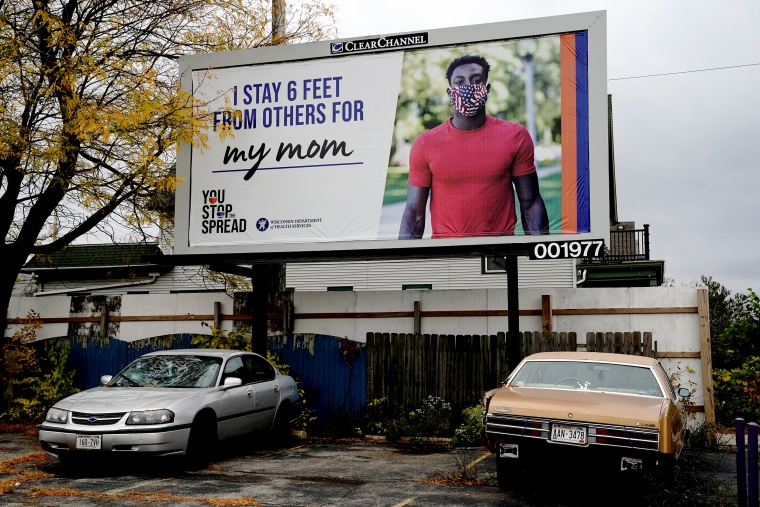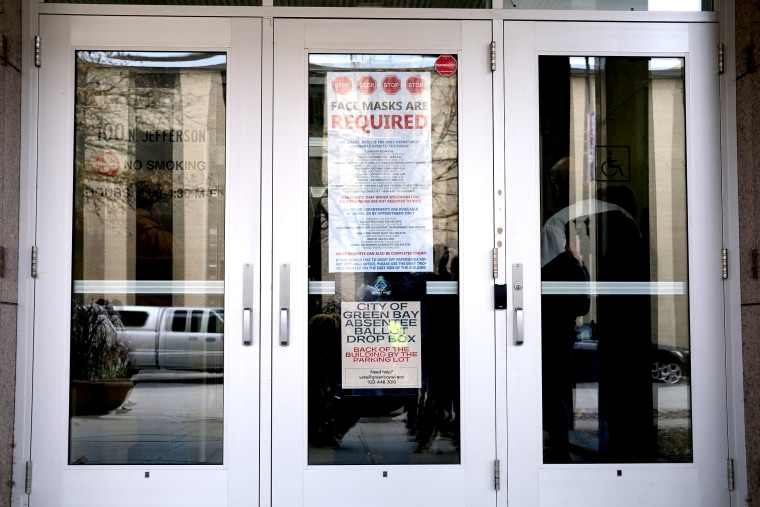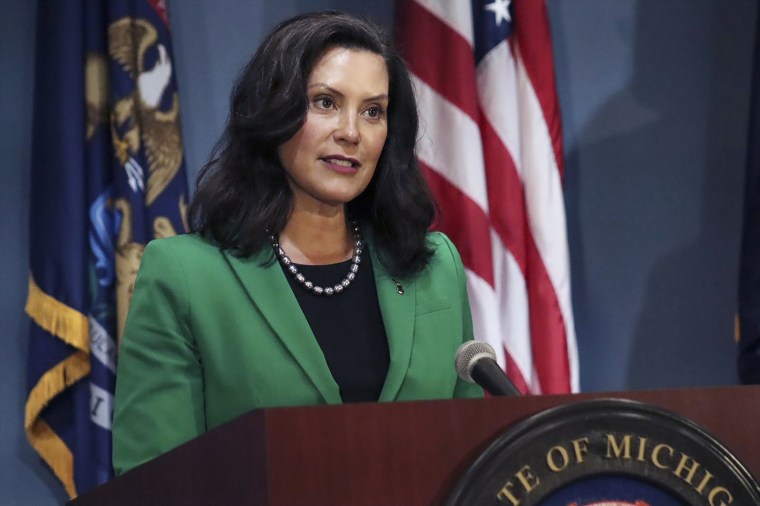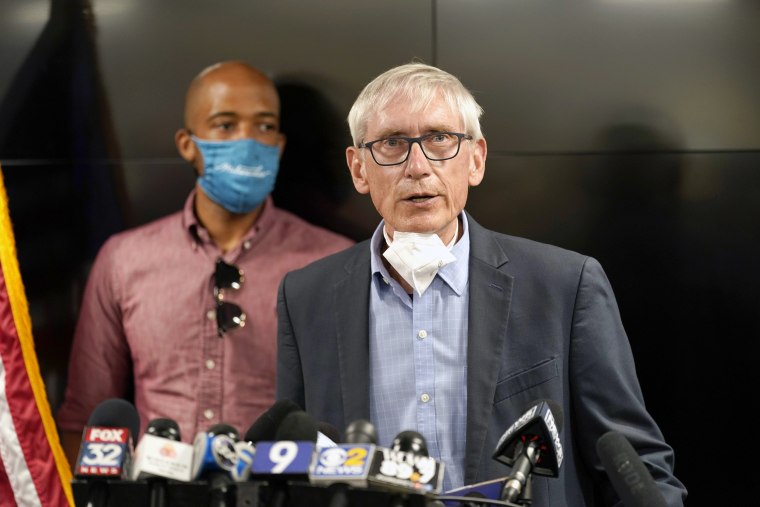Coronavirus cases have surged to their highest levels yet, but conservative state legislators across the U.S. are fighting to limit governors’ ability to impose public health restrictions — and have succeeded in two states with rising caseloads in the heaviest hit region of the country.
In public health emergencies, governors have broad powers to impose quarantines and other actions to stop the spread of disease. As emergency orders have stretched on for months, state lawmakers around the country have objected to what they say is governors’ unprecedented use of power for such an extended period of time.
The efforts to limit their power have targeted governors across party lines, but those that have had the most success have been in states with Democratic governors and Republican-controlled legislatures. In Michigan and Wisconsin — two states with Democratic governors, GOP legislatures and largely conservative courts — several challenges have succeeded, limiting state executive authority as cases in those and neighboring states rise.
Full coverage of the coronavirus outbreak
Similar court battles between Democratic governors and GOP elected officials in Kentucky, Illinois, Minnesota, and North Carolina have all been decided in the governor’s favor. A challenge to the Louisiana governor’s emergency order is headed to the state supreme court, but an appellate court this week ruled in support of his use of power.
“The control of infectious disease often relies on legal intervention,” said Dr. Tom Frieden, former director of the Centers for Disease Control under Obama and president and CEO of Resolve to Save Lives, a global health initiative focused on epidemic preparedness. An effective public health law, he said, “provides the government with strong, clear and flexible authority to respond quickly and appropriately to an emergency.”
State of emergency laws differ, but all grant governors the ability to take swift action in times of crisis with little input from other parts of the government. Their use of those powers to close businesses and schools, limit gathering sizes and mandate mask-wearing has been particularly important since the coronavirus pandemic was declared in March. A lack of national coordination has left the states to largely fend for themselves to control the virus’ spread.
“What you have is a need for governors all over the U.S. to reinvent the wheel because the federal government effectively abdicated an essential role,” said Frieden. “It’s made it much harder for governors to succeed.”

Hundreds of lawsuits challenging state public health orders have been filed around the country since the pandemic began. In many states, legal challenges to governors’ pandemic orders have failed. While many cases have been brought by religious groups and restaurants, state legislators have also brought numerous challenges. Those brought by other elected state officials tend to have more standing than lawsuits from members of the community, experts said.
Last month, Michigan’s highest court found the governor did not have the authority to continue the state of emergency for the pandemic after the legislature voted against an extension in April, immediately canceling the more than 150 executive orders she had issued as part of the emergency. Back in May, the Wisconsin Supreme Court similarly struck down the state’s stay-at-home order, made by the head of the health department at the direction of the governor, for exceeding the executive branch’s authority. Both cases were brought by the Republican-controlled state legislature.
The decisions are examples of the way in which courts have increasingly become policy and political battlegrounds, experts said.
“Typically courts try to stay out of this,” said Paul Nolette, chair of the political science department at Milwaukee’s Marquette University. “They're not the experts in these areas and they tend to defer to governors in times of emergency and crisis.”
But the partisan court battles that limited the governors’ power have left Wisconsin and Michigan with fewer tools to address current surging cases. Wisconsin’s governor is currently unable to impose gathering size limits or close restaurants and Michigan’s governor cannot continue some of the economic relief measures she put in place, without input from the legislature. Both states have seen record Covid-19 case numbers in the last month, with cases rising more than 17 percent in the last week alone, according to the Covid Tracking project.
Court rulings diminishing a governor’s power to take swift public health action are “a huge problem,” Frieden said. “You don't even need to look any further than the explosion of cases in Wisconsin to see how damaging that kind of legal result is.”
‘Court decisions whiplash’
The legal blows to Gov. Tony Evers' coronavirus response began in May, when the state supreme court struck down Wisconsin’s “Safer At Home” order, in a case brought by the Republican-controlled legislature.
The leaders of the state House and Senate issued a joint statement after the ruling, urging Evers’ administration to work with them on new rules that “would provide clear guidance in case COVID-19 reoccurs in a more aggressive way.”
“We are confident Wisconsin citizens are up to the task of fighting the virus as we enter a new phase,” they said.

Republican legislators had been working to limit Evers’ authority since before he took office. When he defeated the two-term GOP incumbent Scott Walker in November 2018, they pushed through a series of bills in a lame duck session prior to his inauguration to curtail the governor’s powers.
When the supreme court ruled in favor of the GOP legislature in the “safer at home” case on May 13, it reduced his emergency powers and lead to a patchwork of local city and county public health policies.
At a press conference shortly after the decision, Evers said he believed the lack of a statewide approach would cause massive confusion. “I can’t imagine another state that is in this predicament where mile by mile there may essentially be different rules across all the state of Wisconsin.”
Efforts by the Evers administration to control the spread of the virus since then have been repeatedly challenged.
On Oct. 6, as the number of Covid-19 cases rose, the Wisconsin Department of Health issued an emergency order limiting indoor gathering size and restaurant capacity. The order was quickly challenged by a restaurant trade group and a month later, an appeals court ruled against the state, stymying its efforts.
“Today’s decision comes as we reported more than 6,000 new COVID-19 cases—the most ever in a single day,” Evers wrote on Twitter after the decision. “This is another blow to our state's response to this pandemic and our efforts to keep Wisconsinites safe.”
The state supreme court declined the governor’s appeal of the case.
“It is unusual to see the courts taking this aggressive stance and pushing back against the governor,” said Nolette. “They’re essentially saying that the governor has exceeded legal authority and can't take these actions.”
Evers’ orders are still under attack: he used a different emergency law to impose a statewide mask mandate over the summer, which was challenged by several Republican groups and is scheduled for state supreme court arguments next week. His health department has also been prevented from releasing information about businesses with positive Covid-19 cases while a lawsuit over the policy plays out.
In early November, Evers delivered a radio address, appealing to Wisconsinites to take precautions to protect themselves and their neighbors.
“We’ve got to get back to the basics of fighting this virus — I know everyone is tired of all the court decisions whiplash, so here’s the bottom line: stay home,” he said.
In the week since, cases and hospitalizations have continued to climb. Wisconsin now has the fifth highest per capita cases of any state, according to the CDC. Evers followed his radio address with a statewide prime-time television address Tuesday, announcing a new executive order advising, but not mandating, all Wisconsinites to stay home. The order carries no legal weight.
‘What happened in Wisconsin can happen in Michigan’
Efforts by Michigan’s Democratic governor, Gretchen Whitmer to control the spread of the virus have also run into obstacles from strong Republican power in the legislature and courts.
“Politically speaking, you have a pretty similar situation in both states,” said Nolette. “It really created a situation where Republicans had a lot of avenues to push back on a Democratic governor’s aggressive use of powers to try to tackle coronavirus. And as things got more and more polarized over the issue, especially after those first couple months of March and April, the partisanship on this has just been through the roof.”
In October, the Michigan Supreme Court decided two cases over the governor’s emergency powers — one of them brought by the Republican-controlled legislature — ruling she did not have the authority to extend the coronavirus state of emergency past April, when the legislature refused to do so.

“This ruling is great news for Michigan,” Senate Majority Leader Mike Shirkey said in an Oct. 2 statement. “The courts have ruled in favor of a government system of checks and balances and citizens will benefit the most.”
The decisions immediately rescinded all of Whitmer’s nearly 200 coronavirus-related executive orders, and prompted initial chaos about whether some 830,000 Michiganders would lose unemployment benefits and if other measures to prevent the spread of Covid-19 would suddenly lapse.
Whitmer requested a several week transition period before the orders were invalidated, saying in a statement she “vehemently” disagreed with the ruling. The court denied her request.
The state health department has stepped in, issuing its own emergency orders to reinstate many of the protective measures that were in place under the governor’s emergency orders. But the department’s authority doesn’t extend to as many areas of pandemic response as the governor’s did. Unemployment benefits, for example, were only extended after the legislature and governor reached a deal in mid-October.
Robert Gordon, head of the Department of Health and Human Services, said the new public health orders were crucial to help stop Michigan from seeing the surges unfolding in the state next door. “What happened in Wisconsin can happen in Michigan,” Gordon cautioned in an Oct. 5 statement.
It may yet happen. In the weeks since, the spread of the virus in the state has shown no signs of slowing, with new cases rising more than 18 percent in the last week alone.
The department’s epidemic orders now also face legal challenges. But the Nov. 3 election tipped the state supreme court from a narrow Republican majority to a narrow Democratic one, so Whitmer’s policies may face a friendlier bench when the court shifts in January.
‘Better safe than sorry’
Wisconsin and Michigan’s governors are not the only ones that have had their power to control the spread of the virus limited in some fashion through lawmaker actions.
Tom Wolf, Pennsylvania’s Democratic governor, saw some of his emergency orders briefly lifted in September when a federal court declared them unconstitutional, in a case brought by several counties, some Republican state legislators and businesses. But a federal appeals court decided a week later that the orders can stay in effect while it hears the case. The state supreme court had already ruled in Wolf’s favor over the summer, in a case brought by the Republican-controlled legislature arguing it could use a resolution to unilaterally terminate the governor’s emergency powers.
With more states imposing restrictions again to combat rapidly rising case rates, the number of challenges is only likely to increase.
“As time has gone on, there's been Covid fatigue, and that’s resulted in more legal challenges,” said James Tierney, a Harvard Law School lecturer and director of its attorney general clinic. “Unfortunately, a lot of public health issues have become political and not scientific in the last three or four months.”
In some states, lawmakers have focused their efforts on new legislation to curtail the governor’s emergency power.
After Democratic Kansas Governor Laura Kelly won an April court battle at the state supreme court to keep her emergency order limiting religious gatherings in effect, the Republican-controlled state legislature quickly passed a bill to limit her authority in May. Kelly vetoed the bill, but signed a compromise bill the next month, which restricted her emergency powers but kept the state’s pandemic response plan in place. The bill meant counties were able to opt out of a mask mandate issued by the governor in July, and most did.
Lawmakers have since proposed at least 37 bills to change the state’s emergency management law, largely focused on regulating the governor’s authority, according to the Topeka Capital-Journal.
Download the NBC News app for full coverage of the coronavirus outbreak
“The fundamental concept in public health law is the precautionary principle — better safe than sorry,” said Frieden, the former CDC director. “The fundamental philosophical concept is that your right to swing your fist ends at my nose. And your right not to take steps to prevent infection ends when you spread an infection that could kill me.”
Many legislatures come back into session around the new year, and more governors may be facing new limits to their power to respond to the rapidly changing public health crisis. In states from Indiana to Utah, lawmakers in majority Republican legislatures have already held hearings and drafted bills to limit governor emergency power and give legislators a greater role during public health crises.
In Ohio, Republican Gov. Mike DeWine signed a bill in September limiting his ability to close churches and move elections during future emergencies, but vetoed an earlier bill from the Republican-controlled legislature that would have decriminalized public health order violations.
“It's been very problematic to see legal challenges to the basis of public health,” said Frieden. “And the basis of public health is that we're all connected. By recognizing that, we can protect ourselves and each other.”

